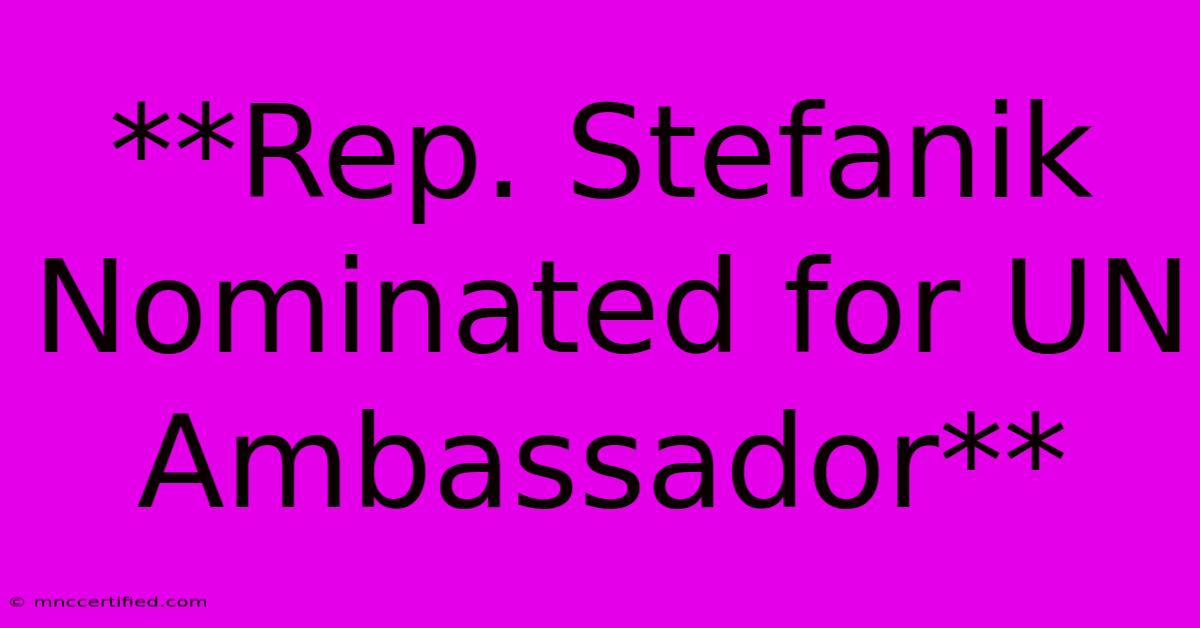**Rep. Stefanik Nominated For UN Ambassador**

Table of Contents
Rep. Elise Stefanik Nominated for UN Ambassador: A Look at the Potential Appointment
Rep. Elise Stefanik, a New York Republican, has been nominated by President Donald Trump to serve as the United States Ambassador to the United Nations. The nomination has sparked significant debate, with supporters praising her strong leadership and experience, while critics raise concerns about her political record and lack of foreign policy experience.
A Rising Star in the Republican Party
Stefanik, at 35 years old, is one of the youngest members of Congress. She was first elected in 2014 and quickly became a rising star in the Republican Party. Her strong conservative views and articulate public speaking have made her a frequent guest on cable news programs and a popular figure at Republican gatherings. She has been a vocal supporter of President Trump and his policies, and has served on several key House committees, including the House Armed Services Committee.
Experience and Qualifications for the UN Ambassador Role
While Stefanik has garnered praise for her political acumen and leadership within the Republican Party, her qualifications for the UN Ambassador role have been called into question by some critics. Her experience lies primarily in domestic policy, and she has limited experience in foreign affairs.
Supporters of the nomination argue that her strong leadership skills, coupled with her understanding of American values and interests, will be valuable assets in representing the United States on the world stage. They believe that she will be a strong advocate for American interests and will be able to effectively navigate the complex diplomatic landscape of the United Nations.
However, critics point to her lack of foreign policy expertise as a cause for concern. They argue that the UN Ambassador position requires a deep understanding of international affairs and a proven track record of navigating complex diplomatic negotiations. Critics also point to her outspoken support for President Trump's policies, some of which have been controversial internationally, as a potential liability.
Key Challenges Facing the Next UN Ambassador
The next UN Ambassador will face several challenges. The United Nations is a complex and often contentious body, and the United States' role in the organization is a subject of ongoing debate. The new ambassador will need to be able to effectively navigate these complexities and build strong relationships with other UN member states.
Other key challenges include:
- Resolving conflicts around the world: The UN plays a vital role in mediating conflicts and promoting peace. The next ambassador will need to be able to work with other member states to address global challenges.
- Addressing climate change: The UN is a leading forum for international cooperation on climate change. The next ambassador will need to be able to work with other member states to develop and implement effective solutions.
- Promoting human rights: The UN is committed to promoting and protecting human rights around the world. The next ambassador will need to be able to work with other member states to ensure that human rights are respected.
Conclusion
The nomination of Rep. Elise Stefanik to be the United States Ambassador to the United Nations has sparked a debate about her qualifications and experience. While her supporters see her as a strong leader with the ability to effectively represent American interests on the world stage, her critics raise concerns about her lack of foreign policy experience and potential biases.
Ultimately, the effectiveness of the next UN Ambassador will depend on their ability to build strong relationships with other member states, address the complex challenges facing the world, and effectively represent American interests on the global stage.
Keywords: Rep. Elise Stefanik, UN Ambassador, United Nations, foreign policy, Republican, President Trump, nomination, qualifications, challenges, global issues, diplomacy, leadership, international affairs, human rights, climate change

Thank you for visiting our website wich cover about **Rep. Stefanik Nominated For UN Ambassador** . We hope the information provided has been useful to you. Feel free to contact us if you have any questions or need further assistance. See you next time and dont miss to bookmark.
Featured Posts
-
Real Estate Investment Clubs Near Me
Nov 12, 2024
-
How Long Does It Take Bondo To Cure
Nov 12, 2024
-
Bishop Urges Archbishop Welby To Step Down
Nov 12, 2024
-
Delphi Murders Trial Allen Found Guilty
Nov 12, 2024
-
Dolphins Rams Week 10 Preview 4 Key Matchups
Nov 12, 2024